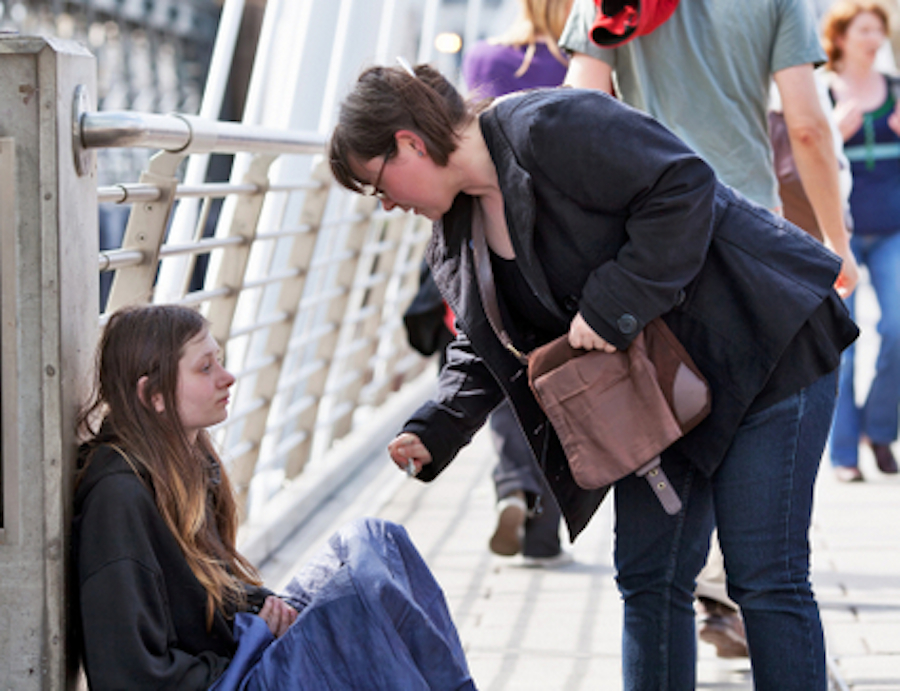
What is stopping you from loving? Wholeheartedly, unconditionally, overabundantly? Not in some half-baked way of “loving” someone while still holding them in judgment for what you think is wrong with them. Really loving. Like being the kind of neighbor you always wanted to have. You know, that’s the primary job Jesus gave to those who claim Him.
So here’s a story you have probably heard, but stick with me for a fresh look at it. Some religious leaders are sitting around talking with Jesus, and one asks Jesus how to be right with God. Jesus asks them what their law from God says, and they say, “Love God with all your heart, soul, mind and strength, and love your neighbors as yourself.” He says, “That’s right, that’s how to have real life.” Now, a child might have been satisfied. “Okay! I will love God and love my neighbor!” And then that child would have been asking everyone they meet, “Are you my neighbor?” If you know children, you know they would have excitedly taken that on job just as it was given to them: love God and love your neighbor.
But the religious expert gets a little dicey with Jesus–because he wants to show how righteous he is. He asks, “Who is my neighbor?” Then Jesus tells an amazing story. He tells about a man who’s been beaten and left for dead. (Matthew Shepherd comes to mind.) Along comes a priest followed later by a Levite (religious law keeper). Both walk by on the other side of the road. Really. They go out of their way to avoid this dying or possibly dead man. Now these are two men whose very job required them to provide acts of mercy, to help those in need. Yet to even go near this man would mean they would have to undergo ritual cleansing. So they were in a pickle. (Okay, going out on a limb here, but the purpose of required ritual cleansing, when you touched a dead or dying person, was to prevent spreading disease to the whole camp. Make sense? So it was part of the law, and pretty intense–requiring in essence a quarantine period–but it was to protect the people, not the goal in itself.) On the other hand, the position of priest and Levite required them to help those in need, show mercy, to provide relief and comfort to those in distress. It’s part of the job description. According to the commentary, “Their inhuman conduct here was a flat breach of the law.” So we’ve got a law designed to protect the people from an outbreak of disease, and we’ve got a law to provide help and comfort to those in need, and frankly, I don’t think those men wanted to have to go through all that, so they just said, “He’s probably dead anyway,” and left it at that.
Then along comes the hero, although the listeners at the time wouldn’t see him as a hero — he was actually from a hated race considered as less than animals, while the beaten Jew is from the “pure” race. He’s a black man helping a delicate white woman in the deep south in the 50s. He’s a transgender man helping a deacon at Westboro Baptist Church. And Jesus shows him as the hero of the story! Don’t you just love that?? He’s the hero because he’s the one who actually helps the dying man! He gives him first aid, lifts him onto his donkey and takes him to a hotel, where he stays with him, and then gives the innkeeper money to continue to care for the man, saying to do whatever is needed and if it costs more, he’ll pay it when he comes back. He is the one in tune with the heart of God.
Jesus is really showing us something here about love, about loving regardless of human division, about not letting rules get in the way of love. The biblical law was given for specific purposes, not as an end in itself. Never was it an end in itself. It is always about relationship. The ritual cleansing was to protect the people from epidemic spread of disease, but not to prevent helping a dying man. Keeping the Sabbath was to refocus people’s hearts on God, not keep them from helping each other. Sometimes love is inconvenient, often sacrificial, but it’s always the right thing to do.
To say, “Love the sinner, hate the sin,” is a way to disdain someone while pretending you’re being noble, just the same way that asking, “Who is my neighbor?” is a way to show good you are without having to get your hands dirty. But both are contemptible.
I love that the Good Samaritan, as he’s come to be known through the millennia, is not hindered by religion. He doesn’t have to pause and say, “Geez, I wonder what the Bible say about this?” He immediately knows the right thing and he does it, above and beyond any obligation of the law! How much more do we, when we listen to the very Spirit of God who resides inside us, know the right thing to do?
Blessings to you as you seek to love with a whole heart, unhindered by religion. Take heart, we’re in this together.












